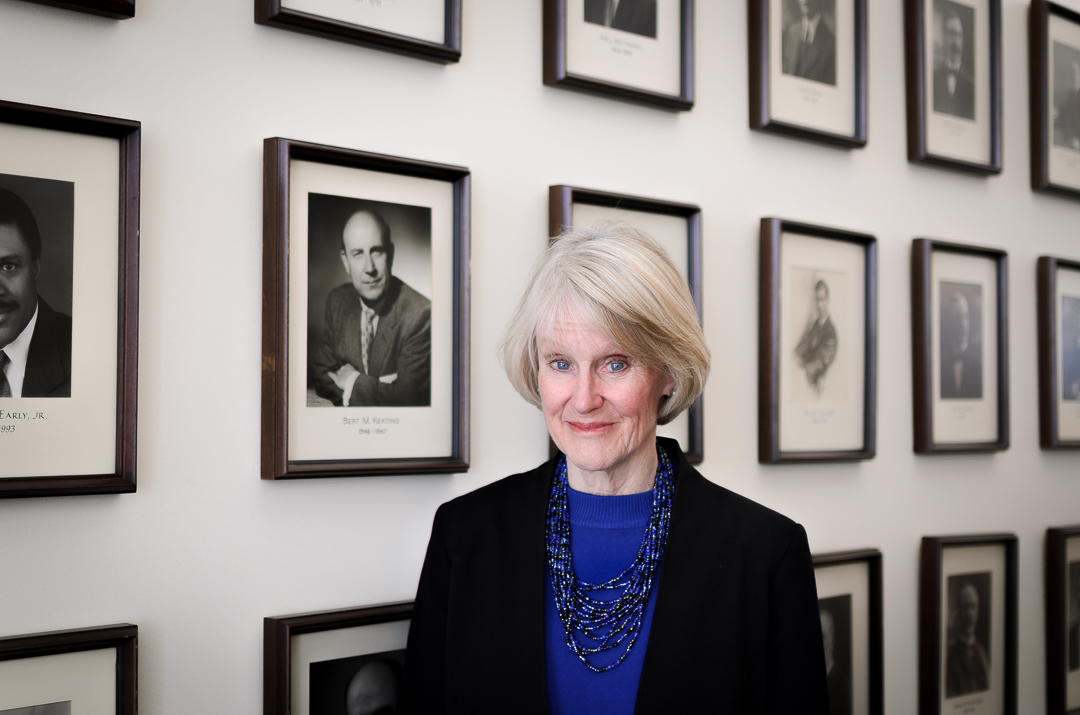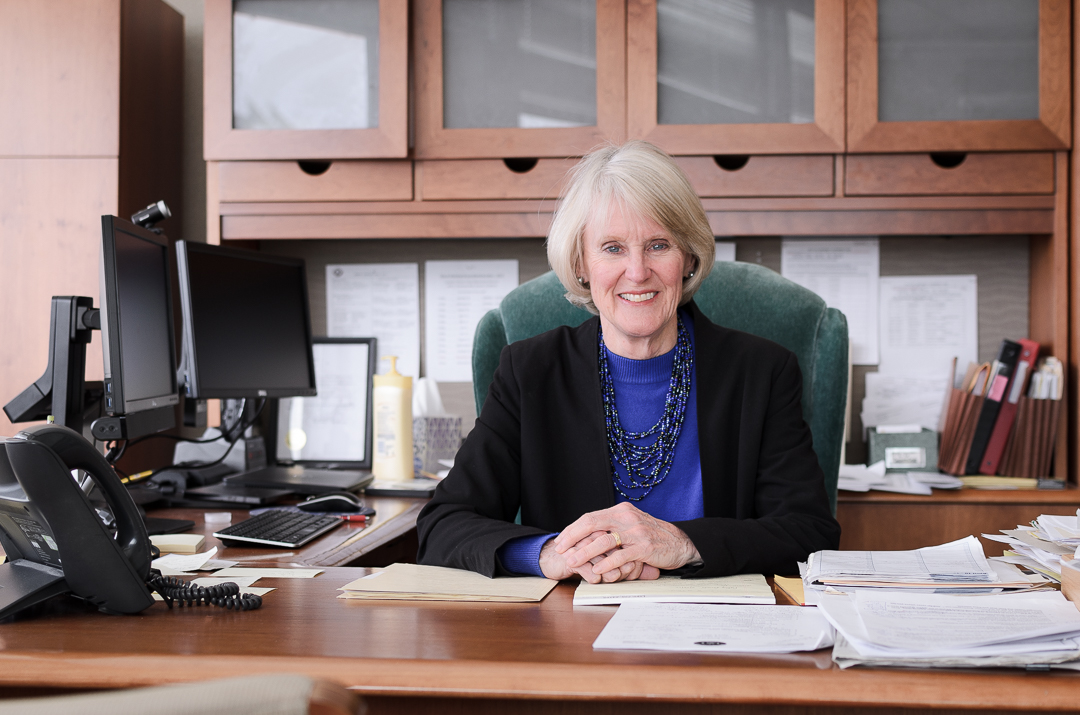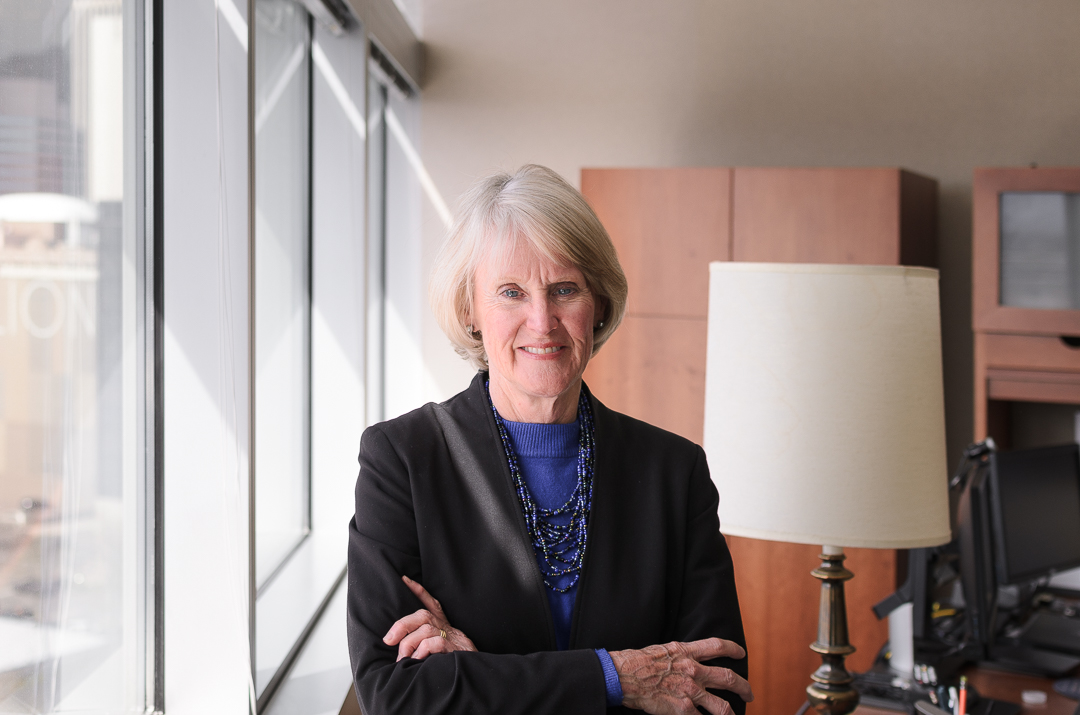Since Denver was designated a city and county in 1902 many of the top political positions such as mayor, governor and US senators have been held by men. Breaking the 115 year streak Beth McCann is the new district attorney of Denver and we wanted to ask her questions about topics ranging from her career starting as a young female lawyer in the ’70s, to her recommendations for today’s young women to shatter the remaining glass ceilings in the city. We were also curious about her priorities in the office and any other long-term goals she has politically.
303 Magazine: What was attending Georgetown Law School as a woman in the ’70s like?
Beth McCann: It was interesting, in my class we had sections of 125 students and there were five of us. Georgetown was a pretty conservative school, the undergrad is Jesuit, and some of the professors were fairly conservative in their viewpoint and weren’t overly thrilled to have women in the classroom. There were a few professors who either wouldn’t call on women or who would call on them in a way that was challenging. But, that said, many of the professors were fine. They were accepting and I found the students by and large to be accepting. It was a little intimidating, women weren’t really going to law school in big numbers then, now I think law schools are over 50 percent women. But, it was exciting because we were sort of blazing the trail, this was the time when people were really starting to talk about women’s issues and feminism. But it was new and different, a lot of people were not happy about this.
303: When and why did you move to Denver?
BM: When I was in college I did a summer in Yellowstone park as a maid. I wanted to travel and see different parts of the country so I went to Yellowstone and I just fell in love with the West. I like the mountains, I like the openness of it. Denver was really the only big city in the West so I decided to apply for a job while I was in law school for the summer to see if I liked it. I came for the summer for an internship and I loved it. I like to hike, to bicycle and ski. I got a clerkship here with a federal judge, which was really what I wanted to do, I came out here and I never left.
303: What are your priorities as the DA?
BM: Juvenile justice continues to be a huge priority, and human trafficking. I am not really involved now in the health care field. I was chair of the health care committee, one of the health care committees in the house so I continued that interest but primarily now I am interested in criminal justice and criminal justice reform – making our system work as best as it can and keeping the city safe, so a little different.
303: Within days after the election you and Leslie Herod [the current District 8 Representative] held a town hall meeting about the future of civil rights in Denver. Now, several months later, do you see evidence of attacks on civil rights taking place in Denver? And what are you able or committed to do to protect or change these?
BM: We do that on a daily basis. In terms of people who are charged with crimes, we are very careful to make sure that the attorneys here and the police department respect all the due process rights and the search and seizure rights when we go through a criminal case. I think the bigger picture of undocumented individuals and the role of the city in that regard is a little bit bigger. My office doesn’t have direct influence there. One thing that we do get involved in is the certification for a certain type of visa if an undocumented person is the victim of a crime. If they report it and cooperate with the police and then with our office they can apply for a U Visa and we sign off on those certifications. We submit the paper work and then the federal government makes a decision. We do not know what is going to happen with respect to those at the federal level, but we will continue to recommend U visas, or at least submit the paper work for people who are victims of a crime.
303: Why do you think it has taken until now to elect a woman to this office?
BM: I think the criminal justice system has traditionally been a pretty male-oriented profession, particularly the law enforcement piece of it. It hasn’t been something that women have gone into in great numbers, although now they are. I think that it has taken awhile for people to accept women in these high level political positions. We have not had a women mayor or a women governor here or a US senator in Colorado, which is really surprising considering the number of really talented women we have. I think since I ran 12 years ago the climate has definitely changed. Back then I was much more concerned about running as a woman for DA than I was this time because I think we have seen more women in political leadership positions. We’ve also seen more women on TV as prosecutors and people have become accustomed to seeing women as lawyers.
303: Taking from your journey, what advice would you give to young women looking to break the glass ceiling?
BM: The glass ceiling, the concept, is a woman can go so high and then there is this glass ceiling that she cannot get above for various reasons. And I think it has been used particularly with reference to corporate America and how few woman CEOs we have and how few women are members of boards of corporations. I think that has been seen as a stronghold of male domination, and certainly it has been true in some political situations. My advice is work hard, do the best you can just generally in your profession, because I didn’t really run [for office] until I had established myself as a lawyer with a reputation. That’s one way to do it. I have seen more and more younger women being willing to run for city council and school board which is also great. If you are going to do that it is very important to network and get involved in either someone else’s campaign where you learn and you meet people and you learn how campaigns work, or to get involved in some of the non-profits that are active politically. It is important that people know who you are and that they know you are willing to contribute and work. You have to have a base of some kind.
303: Why is it important to acknowledge successes of women and minorities in the legal field and political landscape?
BM: I think it is always important because you never know what’s going to resonate with some young woman or girl in a particular area, not just in politics but in a lot of fields. There are some women scientists doing important work; there are women heads of corporations doing important work. There are several impressive women in Denver that are heads of [health] insurance companies. One of the reasons I went to law school, honestly, is when I was in college I did a visiting semester and the dean [of students] of that school was a woman lawyer, and she was very impressive. I never really thought that much about law school and I just thought, ‘Well if she can do this, I can do that.’ I think it does help that we continue to talk about successful minorities and women.
303: When you founded the Colorado Women’s Bar Association what was the goal and do you think it remains relevant today?
BM: Yes, that was in 1978, and it was a group of women. We met in the basement of Natalie Elwood’s law office, which was just a little house, and we started talking about things we were encountering in court or in practice. There were judges who insisted on calling us “honey,” and just things like that that were seemingly insignificant but were not insignificant. We just decided we needed to form a women’s bar, because then we could network with each other and focus on issues that were particularly important to women. It was quite controversial, the impression was that we were rejecting the the bar association, that we were saying they weren’t meeting the needs of women lawyers. We were very fortunate that the head of the Colorado bar at that time was a man named Chuck Turner who was very receptive. I am still an active member and I go to a lot of the events and what is encouraging is just in the last few years we have seen an uptick in the number of younger women joining. It is a great networking opportunity, you meet each other and you talk about different issues, legal questions, we have a lot of great speakers, there is always a seminar about how to become a judge and we have a judicial committee that the governor’s office always asks for recommendations when he gets the list of names, so we have input into selection of judges. There are really active committees and that is a great way for someone who is interested in politics to get involved, join the bar, get into a committee, meet people, take on a project. It is a great organization and I’m really pleased it lasted.
303: Do you believe that there is still evidence of sexism in politics? Have you been affected personally?
BM: I hope people are more conscious of the sexual innuendos in the workplace and the harassment, those kinds of things, but it continues to amaze me that we still see so much of it. It is definitely there but it is changing. There are more and more women in the workforce and there are more and more men who want their wives to work and maybe even they stay home with the kids. In my era, when I was a young lawyer, if men stayed home with a child it was ridiculed, now I think men are admired for taking some time off, at least in some circles. I think like anything you just do your work well, you don’t get involved in a lot of pettiness about it. I think there are tremendous opportunities for women right now.
303: Is District Attorney the final destination for you or do you have aspirations after this position?
BM: The district attorney is really a fabulous job. I am enjoying it, it is challenging, it is interesting, it is something I have wanted to do for a long time. I am really happy where I am.
All Photography by Austin Cope.










BM: Juvenile justice continues to be a huge priority, and human trafficking. I am not really involved now in the health care field. I was chair of the health care committee, one of the health care committees in the house so I continued that interest but primarily now I am interested in criminal justice and criminal justice reform – making our system work as best as it can and keeping the city safe, so a little different.
~ With HUGE trafficking busts and the fact that large Masonic and other freak religious temples scatter the landscape of Colorado I will be anxious to see you act upon your words DA. You have the authority to draw big lines in the sand. Let’s see if you do it though. Talking is just talking. You also have the authority to end chemtrailing and start the conversation to rid our landscape of unhealthy agricultural practices being implemented by Monsanto and their sinister sister companies. Being a large majority of Govt’s power players have been implicated in child sacrifice, rape, trafficking, murder and so much more? Are you really prepared to fight the scum that walks amongst you? Our current administration from legislative to even the Governor’s office is so colluded you can no longer see right through crystal clear waters in CO. But you can see the reflective scum that holds the chairs of deceit and malfeasance in the Statehouse. Let’s see if you can pull it off. There are millions among you who are willing to help. So, don’t talk. Instead ACT !!!
Of course…
“Your comment is awaiting moderation” – So much for free speech huh? Pffft … Fake news is censored news.